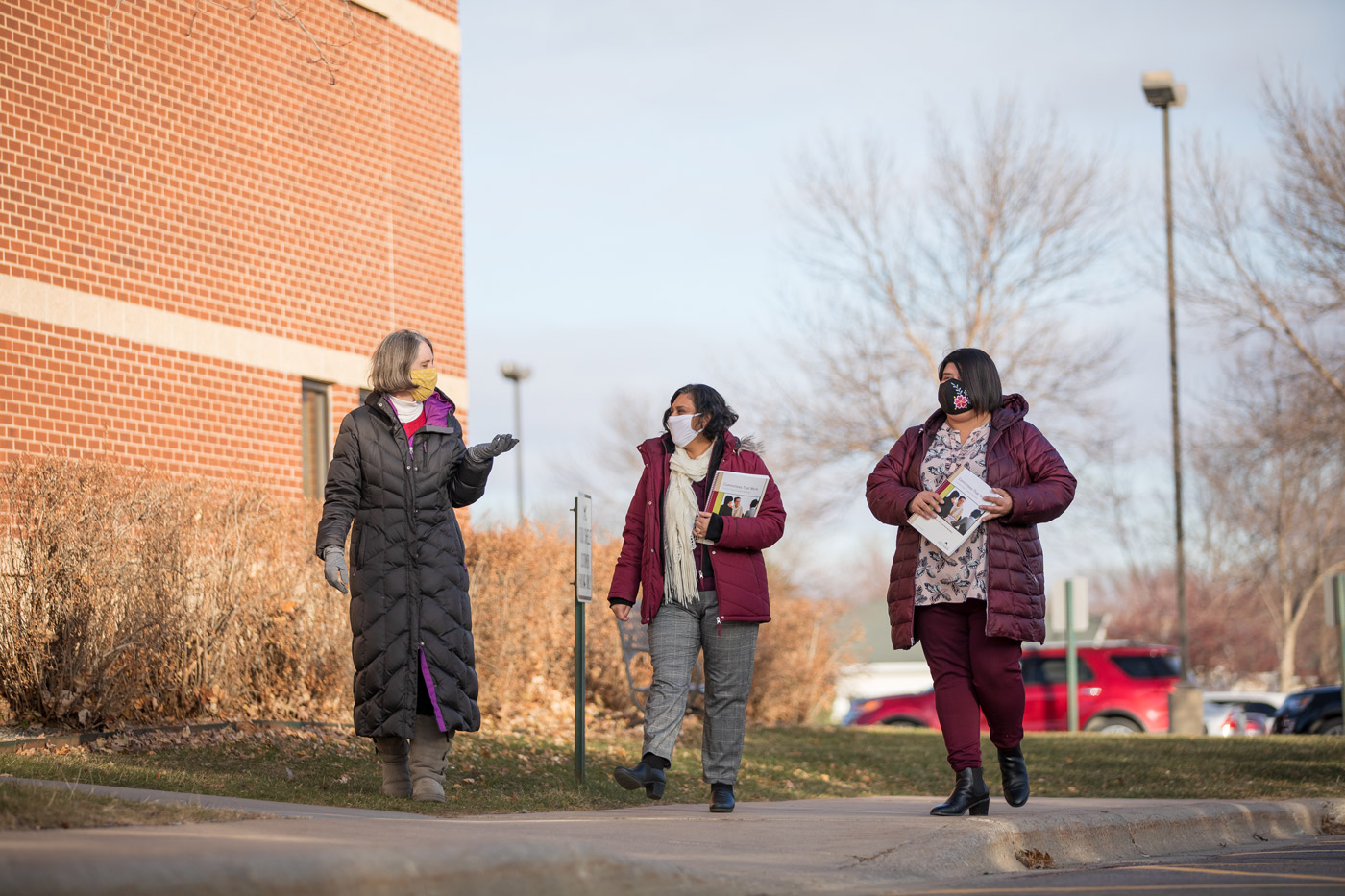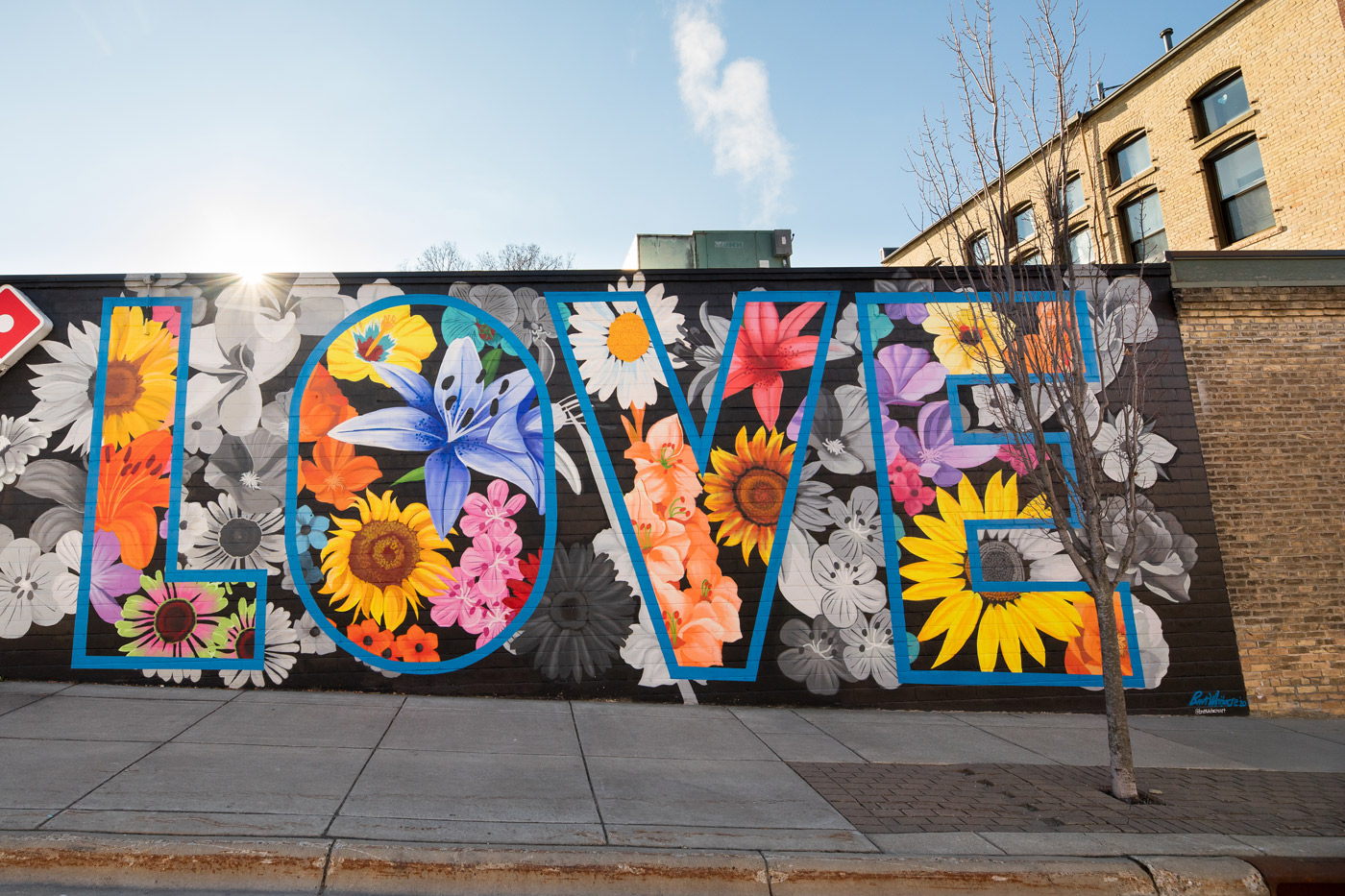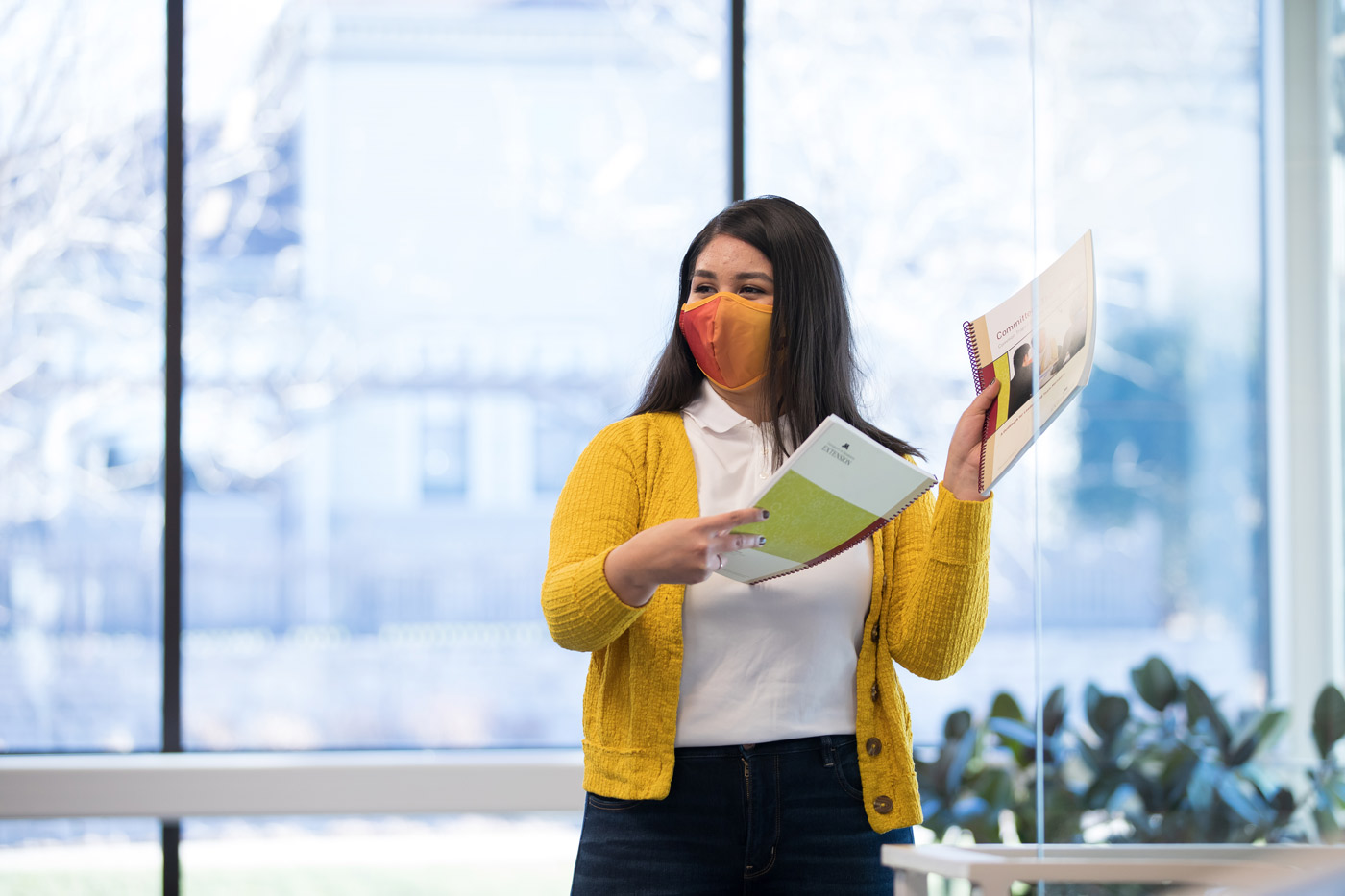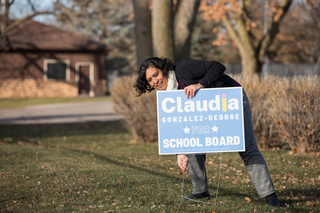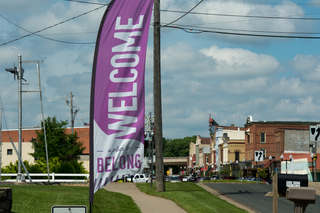Minnesota’s summer of protests, violence, and personal and political reckoning brought issues of race and racism front and center in 2020. For many Greater Minnesota communities, however, making their towns more welcoming to everyone was a priority long before then. Motivated by a variety of concerns, many leaders have partnered with Extension to look more closely at their communities, become educated about the experiences of people of color, and create local change that makes a difference.
Extension has been redesigning community leadership and civic engagement programs to address diversity, inclusion, and racism — an effort that has certainly accelerated since this past summer. In 2020, eight communities intentionally welcomed underrepresented audiences into Extension leadership programs. And from Grand Marais to Mankato, community groups have invited Extension to facilitate learning about cultural competency, unconscious biases, equity, racism, and intercultural competence.
Extension’s programs, always conducted with local partners, use education, mentoring, assessments and a variety of other tools to help communities envision a more inclusive future. We are proud to work with these partners who are making a difference.
Reasons to create change
“For us,” says Nicole Griensewic of Southern Minnesota’s Region Nine Development Commission, “it’s about our workforce. We know we need to be a region that is viewed as a welcoming place. Not only do we need to attract workers, we have - and will need to continue focusing on retaining our talent.”
Other communities are driven to fill leadership gaps. Extension’s Ben Winchester has calculated that in Greater Minnesota, one of every 34 adults must take on leadership roles for elected offices, non-profit boards and committees. “Communities that start new leadership programs often recognize that their community needs people to step up — whether their name is Anderson, Ahmed, or Hernandez,” says Holli Arp, who in 2018 led Extension’s leadership and civic engagement educators to explore ways to invite underrepresented groups into local leadership.
Still other communities believe they need the perspective of diverse leaders to respond to their changing rural demographics. “More than 39 percent of students in Willmar’s Public Schools have a home language other than English,” says Toby Spanier, leadership and civic engagement educator and leader of the Vision 2040 educational cohort. “So there’s no denying that other cultures are part of the fabric of rural communities. In order to serve all residents well, we need people from those communities to be part of the fabric of leadership, too.”
It takes a village — working to address racism
Following are stories from communities across Minnesota that are finding ways to be more inclusive.
“This program provided me with a deeper understanding of myself, which has increased my confidence. I feel a deeper inspiration to step up and get more involved because I feel I can make a difference. And I have initiated steps in my community to get more involved already.”
— Participant, Northfield Emerging Leaders Program
Northfield, Minnesota’s 2018-20 strategic plan is all about becoming a welcoming community. “One way to help our diverse newcomers feel comfortable here is to have local leaders who look like them,” says Beth Kallestad, Northfield’s city coordinator. She notes their city boards and commissions are lacking in diversity. “So one of our strategic plan initiatives is to change that,” she says. In 2020, Kallestad collaborated with leadership and civic engagement educators Mary Ann Hennen and Jocelyn Hernandez Guitron to launch Growing Local: 2020 Northfield Emerging Leaders Program.
The program attracted 15 Northfielders from a mix of gender, age, and race/ethnicity groups that aren’t well-represented on local committees and boards. The program’s design included six educational sessions to help inexperienced leaders communicate effectively, understand their strengths, consider what it is to follow and lead in vital communities, and how to motivate others. (The program moved to a virtual platform in March 2020 to adhere to COVID-19 safety guidelines.) Besides education, though, program staff recruited 15 Northfield leaders to volunteer to coach participants — to cheer them on as they thought about their future contributions. “It was a great way to connect with emerging leaders in Northfield,” said one local coach. “… It definitely gave me more hope about Northfield’s future.”
Since completing the program, participant Claudia Gonzalez-George successfully ran for and won a spot on the Northfield School Board. She will be Northfield’s first Latino board member and was also the leading vote-getter — a testament to the community resonating with her vision. “There is a great community here and I’m surprised we still struggle with issues of access,” she told a local radio station.
Gonzalez-George aims to be a bridge between families and the board. She also hopes to make the community aware of the many strengths its Latino neighbors bring to Northfield that aren’t being accessed. “When we all participate, the community will be better,” she says.
Kallestad has received numerous calls from local committee leaders who want to recruit program graduates for leadership positions. Two program participants serve on city advisory boards, one is on a task force for community and police reviewing policies, and a few have applied for other appointments. “It’s exciting to see people who are already leaders in their circles take the leap into broader community leadership roles,” she says.
Kallestad and her local design team also recognize that existing leaders may need to expand their skillset — and change their mindset — as they recruit and welcome new leaders. “The leadership program provided emerging leaders with new tools, but we wanted these newcomers to lead in places where they know they are supported and feel welcomed by their colleagues,” says former Extension educator Jocelyn Hernandez Guitron. Recognizing that, educators Hernandez Guitron and Hennen delivered an online workshop called “Navigating and Leading with an Equity Lens.” Forty-one board and commission chairs, vice-chairs, and staff liaisons attended the 90-minute webinar, where they considered strategies to create an inclusive culture and use decision-making processes that recognize the contributions of new members.
One participant’s response to the training emphasizes what many Minnesotans are feeling during this profound time of change. “This is an extremely important subject in our community — and our world.”
Highlights from the class of 2020
For video accessibility or alternate formats of this content, call Jennifer Harkonen-Wagner at 612-624-2811.
The Region Nine Development Commission, which coordinates economic development activity for nine rural southern Minnesota counties, is working with Extension, the Greater Mankato Diversity Council, and a host of other partners to help rural communities create a sense of belonging for both new and established residents. Local economic development leaders challenged Region Nine to take on this work when they heard Dr. Ryan Allen describe University of Minnesota research that predicts workforce shortages across Minnesota. Allen’s 2017 report concludes that “Minnesota’s success at attracting immigrants to the state and more effectively incorporating these immigrants into its workforce will play an important role in determining the strength of its economy in the future.”
Region Nine’s partners, including Extension, organized a series of community-driven and research-informed interventions to help southern Minnesota communities consider how welcoming their systems and residents are. Facilitated discussions are allowing people of color to describe positive and negative experiences living in the area. Community assessments, led by Extension’s Scott Chazdon, are helping communities look at their town's readiness to more actively welcome and serve people of color in schools, health care, law enforcement, non-profits, religious organizations, businesses and local government.
Extension engaged the community in the design of the Welcoming Communities Assessment. “The input of rural Minnesotans significantly changed Extension’s original concept for this assessment,” says Chazdon. “They resisted the idea that we can give one assessment ‘grade’ to a community — because towns are made up of a number of systems and organizations – and some are better at integrating people of color than others.” The Welcoming Communities Assessment now heightens awareness about local biases, inspiring southern Minnesota communities to make real-life changes. For instance, the St. Peter Islamic Center now marches with the community in the local Fourth of July Parade and Fairmont’s local newspaper has published its first Spanish-translated documents.
In the midst of the turbulent summer of 2020, Cook County Higher Education in northeast Minnesota turned its attention to helping interested community members learn together about issues dividing the nation. They charged Extension educator Lori Rothstein with facilitating book club discussions of four books — challenging readers on issues of diversity, inclusion and racism. The books — My Grandmothers’ Hands, The New Jim Crow, How to be Anti-Racist and Me and White Supremacy — examined the issues from many perspectives and from the point of view of people of color.
The book club program welcomed anyone in Cook County interested in working through difficult discussions. “Participants ranged from 80-year old retirees to 20-year olds,” said Rothstein. “Together, we were able to support each others’ learning and consider personal actions that can make a difference.”
For participant Karl Hanson, the series was a chance to find support among others who want to be ready to respond when they see racism, especially as he considers the region’s relationship with tribal communities. “I’m a fan of things trickling out through our lives – not necessarily through organizations. We can all step up to the plate. When the pitch comes – when you come close to experiences that require you to see and respond to racism – you have to be ready to try to do things in that instant. It would be better if we could all hit home runs. I want to be ready to do that.”
Lessons from communities
When communities decide to address inclusion and racism, they are asking residents to change assumptions that have been part of American culture for centuries. At a recent conference, Extension joined leaders of the Region Nine project to consider what they learned from starting the initiative. Here are their thoughts:
- It takes time. Trust needs to grow. People need time to talk through concerns.
- The process of starting initiatives is complex. It’s not linear. Be prepared to adjust your sails as you steer.
- Local cohorts, trainings, discussions and assessments can all be a catalyst for local action.
- School districts are strong partners for equity efforts. Schools are on the front line of creating welcoming communities for all students.
- If your project wants to include diverse voices, you will need to partner with organizations and groups that are trusted in the communities that you want to hear from.
- Be prepared to question policies and practices your community has relied upon to get things done. Systems that have worked well for residents so far may not work for your new neighbors now.
Reviewed in 2020


